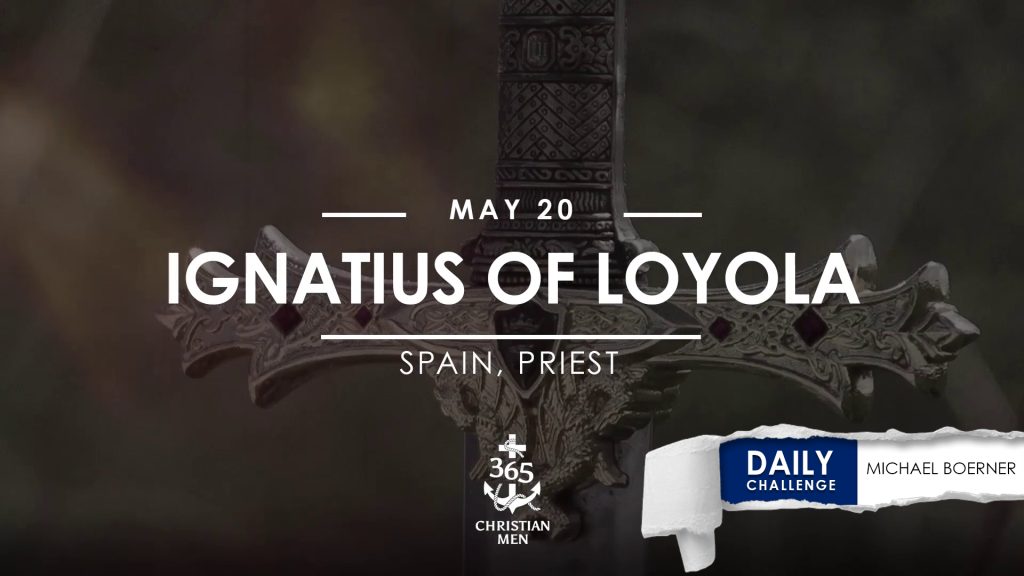May 20. Ignatius of Loyola. Ignatius’s early life followed a predictable pattern for boys born in wealthy, noble families. He started as a page and then a knight—both soldier and diplomat. On this date in 1521, while he was serving as soldier, he was severely injured by a cannonball. He almost died; his legs were damaged, and his career as a knight was decidedly over.
In Ignatius’s second career, he embarked on pilgrimages, lived as a beggar, and often spent up to 7 hours a day in prayer. Being orderly and diligent, Ignatius recorded the way he practiced Christianity in a document called “Spiritual Exercises of Ignatius of Loyola,” which includes meditations, contemplations, and prayers. He practices these disciplines long before he became a priest, and he thought of them as helps for all believers, helps for the necessary change of heart.
Eventually, with like-minded believers, Ignatius founded a religious order known as Jesuits. Here’s how he got started.
What you’re living for may not be what you were created to do.
For 28-year-old Ignatius, cannon fire rang in his ears, the shouts of war echoed in his mind, and the vision of his useless torso and legs bound to a bed challenged his manhood.
He’d been a nobleman. He’d been a hot-headed gambler. He’d been a bon vivant—that’s French for high life of the party. And he’d never been shy about using his sword. He’d been Captain of the Spanish Artillery.
When the French attacked the Spanish town Pamplona, their fortifications weren’t finished yet, and the military outpost was weak. The Spanish officers wanted to retreat. But Ignatius wanted everyone to stay and defend the place until the reinforcements arrived.
Ignatius said, “…to shun the common peril is the nature of cowards; to perish in the universal ruin is the mischance of brave men. I should deem [a man] worthy of immortal glory if he had died of his fidelity.”
Since Ignatius wasn’t in charge, most of the Spanish troops did retreat, but Ignatius and the men he commanded ran into the citadel and fought fiercely. Ignatius stood on the wall. That would be the wall that the French were bombarding with cannon fire.
One cannon-strike drove a stray bit of castle through Ignatius’s left leg, and the cannonball shattered his left. He fell. His men fell. Pamplona fell.
And Ignatius became a prisoner of war.
But his wounds were severe, and the French admired his guts. So they treated him “with all honour for fifteen days.” And they administered the Last Rites.
When he gave up his helmet, sword, and shield, the French even carried him home to his family castle to recover.
But fever ravaged him, and he needed surgery. The leg would never fully heal—a limp was guaranteed.
It was a miracle Ignatius even survived the siege, let alone his injuries. But as his slow recovery lingered, it wasn’t the pain or the suffering that kept his mind dis-eased. His life had been dedicated to the chivalry of knighthood. How could he gain honor and glory in battle when he lay crippled in bed?
No, he would not let glory escape him! He was a soldier of the King. He’d remember his duty. No injury would keep him from battle!
He’d refocus on things that mattered. The knighthood. Being a soldier. Fighting for life and love.
He asked his caregivers for something to read. A good, chivalrous romance. Surely, that would keep his mind occupied. But the only books they had were like Life of Christ by a monk named Ludolph and Lives of the Saints.
Ignatius was perplexed and perturbed. Here he was, recovering in a great castle, but there were no stories of knights? He’d go mad without something to do. Reluctantly, he decided the books at hand were better than staring at walls.
Turned out, he found the true stories…enjoyable. Inspiring, even.
When he lay in that peaceful place between wakefulness and dreaming, he thought of his duties as a soldier, his quest for glory and love—all this was the pinnacle of his career. His joy disappeared. He felt empty. Dead inside.
But when he thought of Christ, the stories were just as glorious. Joy washed over him, and his whole self was bathed in peace. And the deep peace never left.
He compared what he’d read to his life. His years as a knight. Did he really want to spend his life fighting? After the initial high of a win, there was nothing.
All the war and its glory had been a waste.
But the saints served for the glory of Christ and not their own…that felt like true purpose! A heart-fire ignited within Ignatius, and as he recovered, he changed his routine. He’d no longer wish for his old life.
He’d make a new one. A life loyal to Christ. One night, he pledged himself—for the rest of his life—to be Christ’s servant.
“For what was glorious has no glory now in comparison with the surpassing glory,” (2 Corinthians 3:10, NIV).
What things that bring you glory are related to Christ? What you’re living for may not be what you were created to do.
https://www.academia.edu/25277002/The_Spiritual_Exercises_of_St_Ignatius_of_Loyola
Ryan, Edward A. “St. Ignatius of Loyola: Spanish Saint.” Encyclopedia Britannica. Encycloperdiabritannica.com. Updated July 27, 2020. https://www.britannica.com/biography/St-Ignatius-of-Loyola
“The Society of Jesus.” Immaculate Conception Church. Accessed August 10, 2020.
https://jesuitchurch.net/the-society-of-jesus
Treacy, Rev. Gerald C. Ignatius Loyola, The Soldier Saint. New York: Paulist Press, 1942. Internet Archive. Web. 5 Feb. 2019.
Thompson, Francis. Saint Ignatius Loyola. London: Burns, Oates, & Washbourne, 1910. Internet Archive. Web. 5 Feb. 2019.
Story read by Daniel Carpenter





